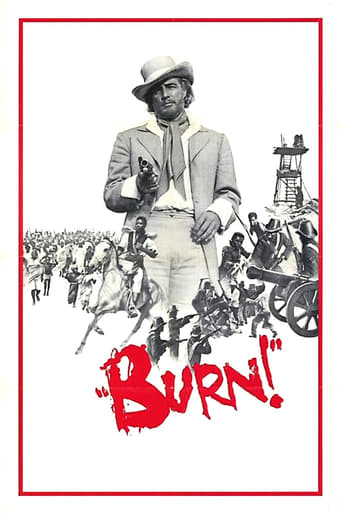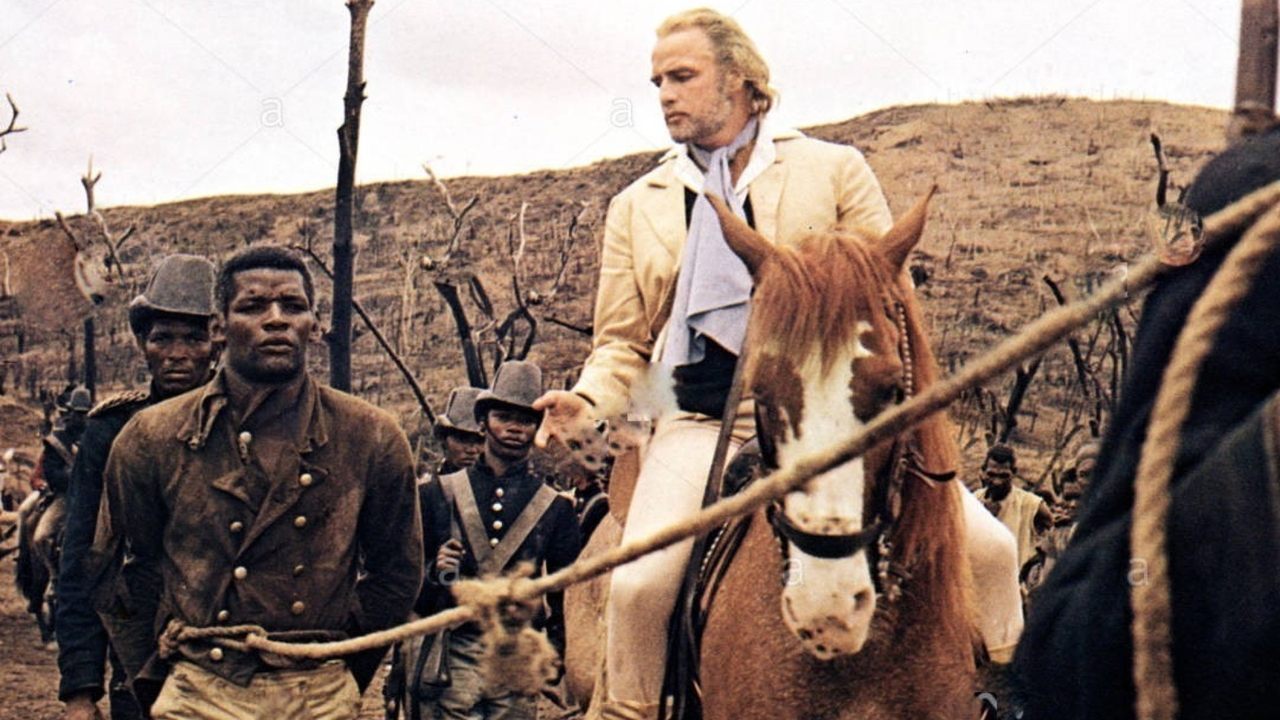Eumenides_0
After I watched Gillo Pontecorvo's brilliant movie The Battle of Algiers, I knew I had to watch the rest of his work. I'm glad to say Queimada! not only addresses similar topics, it's also as good.Sir William Walker arrives in Queimada, a Portuguese colony in the Caribbean, to instigate a revolution that will overthrow the government and set up a new one open to business with the British crown. For that he recruits José Dolores, a nobody, to create a revolutionary army. Things quickly grow, for people have been craving for freedom for a long time, and soon José is a general of an army with thousands of men ready to fight the colonists. All seems well and the two men, who've become friends, depart, Sir William to England as a rich man, and José back to the fields after renouncing his power in favor of the new Republic and the democratically-elected government.But years later Sir William is called back to Queimada. Things haven't gone well and José once again rounded up an army, this time to fight against a democratic government which continues to exploit people long after slavery has been abolished. But this time the English are the enemies and Sir William is the specialist in charge of taking down José and his revolutionaries.Queimada! is an epic story about the struggle for freedom, about shattered friendships, about unforgivable betrayals, and even about modern history, in the parallels with the way the West has disastrously dealt with the Middle East in the last years. It's an intelligent, thought-provoking movie, the type that doesn't get made anymore, not only because of its subversive content but also for its scope, with thousands of extras and landscape shots that hearken back to the days of Gone With the Wind or D. W. Griffith's epics.The acting is top notch, with Marlon Brando, playing a rogue who fights for money and not ideals, who can be your friend one moment and the next your greatest enemy, and yet carries a great amount of dignity in all he does.But Evaristo Márquez is also impressive. A non-actor when Pontecorvo cast him as José Dolores, he may lack the acting experience, but it's impossible to fake the excitement and heart he brings to his role. The relationship between the two is amazing and sorrowful, for it's quickly obvious their friendship won't end well.Queimada! is not an easy movie to watch: it's sad, it's violent, it's nearly hopeless, unlike The Battle of Algiers, which ended on a positive note, its critical of western civilization and the lives the march of progress is founded on. It's a very modern movie and clarifying of many of the problems we're facing nowadays. For that, everyone should watch it.
thinker1691
There are perhaps a dozen films which constitute the benchmarks of Marlon Brando. Reading his biography, I learned this movie " Queimada ' or "Burnt" was among his favorites. After seeing this movie and studying his role with interest, I have to agree his acting was superb! Brando plays Englishman (convingingly) Sir William Walker a young snobbish, aristocratic, adventurer sent from England to the islands conquered by the Spanish and Portugese. His task and that of his government is to incite discontent, insurrection and ultimately revolution. Selecting at random, an ignorant, but potentially educational native called José Dolores (Evaristo Marquez) Walker sets about to teach him how to not only win his freedom, but to eventually overthrow the Portugese and their government. The film story in shown in nearly historical chronologically as it purports to show how the two men change over the years. Distrustful of one another at first, they become fast friends over the decades, until the inevitable happens. The country which was once plagued with racism, injustice and slavery evolves. Yet, twenty years later with Walker returning to visit the country, all of it has returned. Brando's acting is so convincing I believed Fletcher Christian, not Walker had landed in Queimada. Renato Salvatori plays Teddy Sanchez another student of Walker is cautiously curious as to Walker's future plans for him. The movie is a political statement of the suffering plight of many native countries as Europeans arrive with lofty ideals and leave only desolation, death and ruins. This film may be among the best of Brando, but it's also a monumental Classic for his fans. ****
Martin Bradley
Gillo Pontecorvo's bold follow-up to "The Battle of Algiers" has become something of a cult movie over the years for a variety of reasons, (not least for the involvement of Brando), but it is a film that is little seen and was something of a commercial disaster. Set in the Antilles in the mid nineteenth century and dealing with revolution, the studios must have thought they had an adventure yarn on their hands, a swashbuckler albeit with political overtones. But the film is much closer in tone to "The Battle of Algiers" than it is to "The Crimson Pirate" and like "The Battle of Algiers" is almost a revolutionary textbook.Brando's presence is almost incongruous since Pontecorvo cast an amateur, Evaristo Marquez, as his adversary and the film is certainly no 'star vehicle' even if Brando's performance is one of his finest and surely one of his most perverse. He plays William Walker, an English agent provocateur, sent to the island of Quiemada to instruct the natives in the art of revolt and overthrow the legitimate government, picking an uneducated, if charismatic, native, (Marquez), as the revolution's leader. But he instills in the man a Marxist sense of revolutionary fervor over and above what he had originally planned and finds himself returning to the island ten years later to help quell the revolution he had instigated.This is a complex, diffuse film shot, (superbly by Marcello Gatti and Giuseppe Ruzzolini), like a documentary. Despite Brando's presence the studios just didn't know how to market it and it was released in a truncated version, (which is one currently reviewed here). If it isn't the masterpiece "The Battle of Algiers" was or lead us to expect from Pontecorvo, it never deserved its fate. Well worth seeking out.
fedor8
Some call this a Marxist view of colonialism and history, but I'd only partly agree. American liberals, Marxists, and Europe's Left-wingers will surely want to claim ANY revolution or revolt in history as their own, i.e. fitting in neatly with Karl Marx's deluded little theories. Same with movies: they basically watch a film and see what they want to see. However, the revolt in Queimada isn't portrayed in such simplistic, idiotic, black-and-white terms, as we find them in that pitiful Bible of the Left. Once Dolores wins his first revolt, there is the realization that he and his rebels are light-years away from being capable of maintaining a functioning economy. While Marx, in his endless arrogance and ignorance, saw the proletariat as the proper force to guide a country and even all of mankind itself, even Dolores - "formerly a nothing", as Brando called him - himself realizes that the working class/the oppressed lower class/the proletariat/the lowest cast/whatever does not have the necessary education or abilities to achieve anything beyond a successful armed resistance. It is easy to destroy; building a society is quite another matter...This brings us to the more left-wing aspect of the movie: the overly simplistic portrayal of Dolores. The fact is that nearly every black revolutionary established a dictatorship in which the people lived far worse off than under the colonial power in question. Africa is a failed continent today (the only one with minus growth!) not because of white influence but because of a lack of it. The African continent has been far too quickly abandoned in the name of "equality, justice" and other notions, leaving the as-yet-unready and too uneducated black populace to find their own path in a world which was marching off, progressing at a rapid speed. Nearly every African/black country sports a tyranny in which the elections - when there are any - are a mere joke, more like a pathetic circus set up to fool those in the West who really think that the transition from tribal life or slave to modern capitalism is achievable overnight. Hence to portray Dolores as such a self-sacrificing idealist in the William Wallace "Braveheart" vein is utterly absurd and infinitely naive. In fact, William Wallace himself was no squeaky-clean individual. There is no such thing as a "revolutionary saint", the way Marxists, aided greatly by their sympathizers in the Western media, have tried and mostly succeeded in propagandizing mass murderers like Che Guevara into. People who lead the desperate into revolt very often have their own agendas, and aren't rarely intelligent psychopaths (Castro) who see a clever opportunity to get wealthy and powerful by riding on waves of the populace's desperation and genuine idealism and hope. The Marxist notion of the "noble proletariat", who have very little education, yet march bravely and with success toward a prosperous new modern world is just as fantasy-based as the idea of someone like Jose Dolores actually existing in the past or present. Marxists are all ultra-idealists, and what else is idealism but an over-simplification of truth, and an escape into flights of fancy that are nearly always based on wishful thinking rather than a sobering nose-dive into harsh reality."Queimada" is less black-and-white than that, fortunately. It shows the cold realities of economics and human development: one race dominates another, a nation dominates another, a class dominates another class. Empirically, objectively, there is nothing evil, immoral or despicable about this - it's just the way humans are, just the way human psychology coupled with biology works. Animals kill each other in the trillions every single day: it may seem cruel and pointless to us "civilized" Westerners, but only because we have become too soft in our cozy, comparatively luxurious existence. Reality is never what idealists tell you it is - or can be. Besides, the struggle isn't merely one of black against white (now, wouldn't have Hollywood's Oscar voters just loved that...) but there are different interest groups on the island, all with their own problems and enemies.The movie is visually interesting, having that grimy late 60s/early 70s look. I was not bothered by some oddities, such as there being no scenes of the bank robbery, or scenes showing the first clash between Dolores's men and the Portuguese. Good, unusual soundtrack.


 AD
AD




